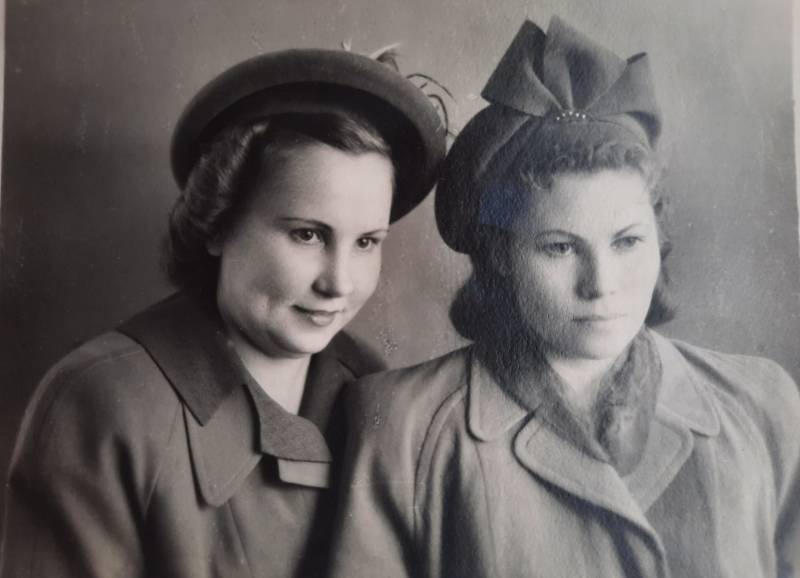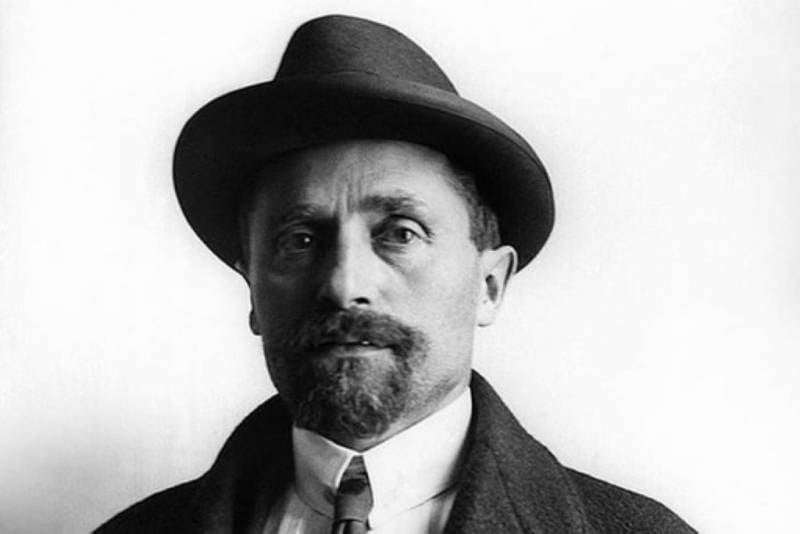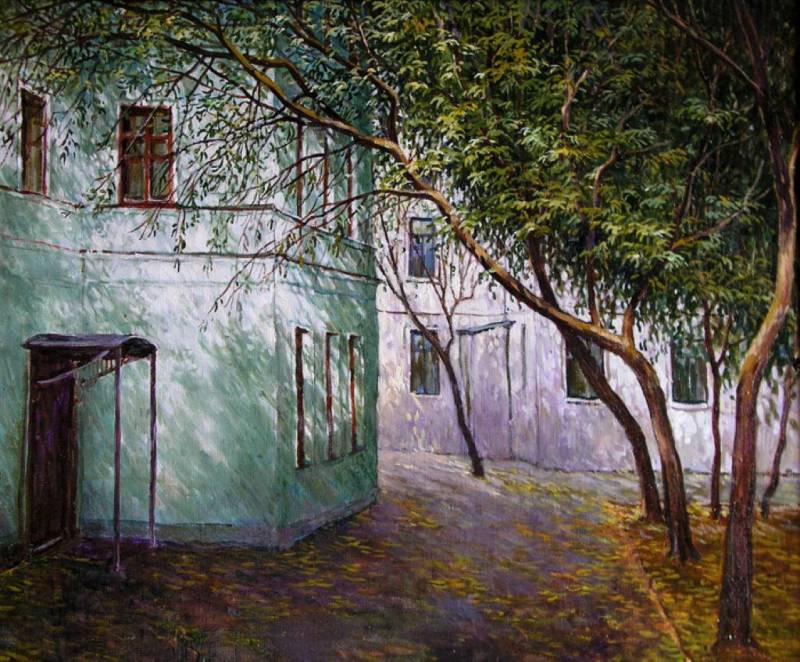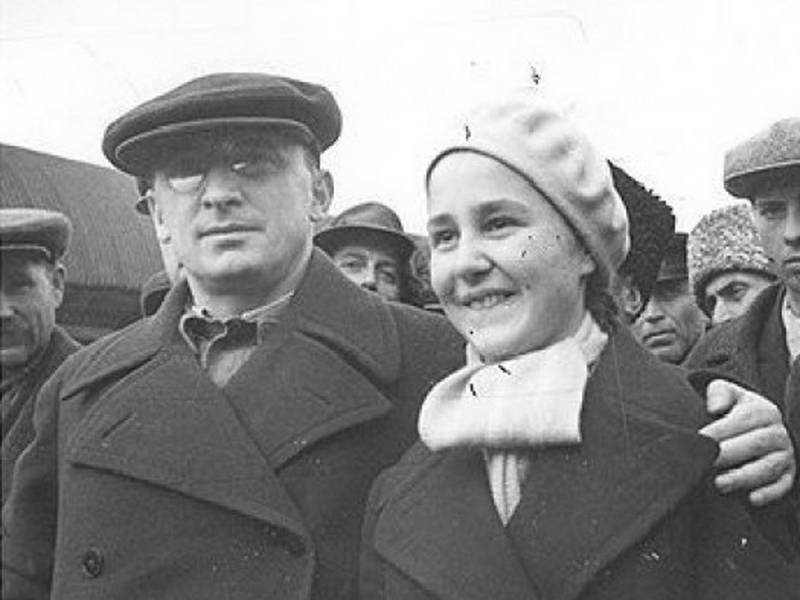At a tea party with Beria. The main “adventure” of the special officer’s wife

It is possible that the hero of a series of our publications, Pyotr Yazev, ended up at BAM because he simply fell into a distribution (in the photo - his wife with her friend Shura). The well-known resolution of the Council of People's Commissars of the USSR “On the construction of the Baikal-Amur Railway” was issued on April 13, 1932. It was along it that design and survey work was launched, and construction of the highway began.
But by the autumn of that year it became clear that the main problem in construction was the shortage of workers. With an officially established number of workers of 25 thousand people, only 2,5 thousand people were attracted.
And after the second resolution of the Council of People's Commissars of the USSR was issued on October 25, 1932, according to which the construction of the BAM was transferred to the special management of the OGPU, it was decided to take on our own people, among others. At the same time, “cleansing” the ranks in which Pyotr Yazev was.
Good wife
And while he was driving trolleys, paving the “road to the future,” Peter did not even realize that his wife, Blagoveshchensk police captain Nadezhda Ivanovna Yazeva, came to his defense. She was also a poetess, who by that time had published several poetry collections in Moscow at the Khudozhestvennaya Literatura publishing house.
Excellently educated in law, she wrote several rather tough and reasoned letters addressed to the new head of state security, Lavrentiy Beria, in defense of her husband. Today people from Stalin’s entourage are considered to be some kind of celestials, but in fact they were much more accessible than both the tsarist dignitaries and the current near-Kremlin “elite”.
And if we were talking about “our own people,” then even Stalin himself could take care of the fate of each of them. Nevertheless, Nadezhda, without waiting for an answer, went to Moscow, hoping to get an appointment with the all-powerful chief of the NKVD. The letters, of course, reached Beria’s office, but no one touched her or even summoned her for interrogation. The captain first went to the publishing house.
The State Publishing House of Fiction (GIHL), in which she published her collections, was founded when Nadezhda Yazeva was still studying at the philological department of Moscow State University, on the basis of the literary and artistic sector of the State Publishing House and the publishing house "Land and Factory". And in 1934 it was renamed Goslitizdat, whose director at that time was Solomon Lozovsky.

Lozovsky (pictured) is a famous publicist, party member, member of the Central Committee, deputy and diplomat, participant in the revolutionary and trade union movement in Russia and France. He was also the Deputy People's Commissar for Foreign Affairs, where he oversaw the problems of the Far East, later took part in the preparation of the Crimean Conference, and became the head of the Sovinformburo, where he oversaw the activities of the Jewish Anti-Fascist Committee.
Meeting at the clay duval
Solomon Lozovsky promised Nadezhda Yazeva to arrange a personal meeting with the new owner of Lubyanka Lavrenty Beria. Stalin only gave orders to his predecessors Genrikh Yagoda and Nikolai Yezhov, but he could consult with Lavrentiy Beria; he even planned individual operations with him.
Today it is well known that Beria not only and not so much planted, but cleared away the rubble after Yagoda and Yezhov. Under him, by 1939, more than two hundred thousand people had left the NKVD camps. Dismissals for political reasons decreased by 61 times, and arrests by ten times.
Only two weeks had passed since that day when a call rang in the room of Nadezhda Yazeva’s aunt from the reception room of the all-powerful People’s Commissar. She was informed that one of these days she would be called to an appointment with him and a car would be sent for her.
And so it happened. That morning, Nadezhda was told to wait for the call at two o’clock in the afternoon and not to go anywhere. And now she is already driving to a meeting in Moscow, sitting in the back seat. In the front are the driver and the security guard. Moscow is washed, clean... and the reflections of shop windows run along the mirrored roundness of a black car.
Here is the corner of Vorovskoye, a mansion located next to the buzzing Garden Ring, where the all-powerful People's Commissar arranged a meeting with the poetess. Beria’s house, where he made an appointment for her, is almost nowhere to be seen. It is surrounded on all sides by a wall like an eastern clay duct. Nadezhda Yazeva had never seen such adobe dungeons before.
As soon as the car, gently squatting, taxied to the solid wrought-iron gate, it opened with a clang. The yard turned out to be unexpectedly – for the center of Moscow – spacious. Its owner was personally waiting for Nadezhda on the wooden, patterned porch in soft flannel trousers and a flannel jacket over a plaid sports shirt.
This made Yazeva, who was already trembling like an aspen leaf, feel completely uneasy. They settled down in the living room, where Lavrenty Pavlovich listened to the poetess’s story about her husband and what happened after the change in the leadership of the NKVD in the Khabarovsk department. Afterwards we moved into the yard. There was a table set for two here.

The wall of the courtyard was covered with ivy, along it there were tubs with evergreen plants - apparently directly from Georgia - and powerful tree-like bushes grew, under which a ditch embedded in concrete flowed silently. Well, a few more fruit trees.
The ditties that were later sung by the entire Soviet people were still so far away that they seemed unthinkable:
Not for Lavrenty Palych.
And for Semyon Mikhalych.
And - for Kliment Efremych...
At the Georgian table
- Lavrenty Beria said quietly, leading Nadezhda Yazeva to the table.
The Georgian table was with an abundance of greens and fried meat, the aroma of which, apparently, intoxicated passers-by who cautiously walked around the house, even those who did not know what kind of tenant was in it. They drank Kindzmarauli, which Lavrenty bottled himself, and the poetess had never even tried before in her life.
Beria joked for a long time, but did not get down to business for a long time. Then he took a light sip from his glass, and moved the second one closer to Nadezhda, who took it.
- I wanted it tomorrow.
- Wait a couple more days. They will bring you a train ticket and take you directly to the train carriage. It's all right?
“Okay,” Yazeva said barely audibly and drank her glass in one gulp.
Slowly it began to get colder.
- Nadezhda Yazeva said not without difficulty.

Lavrenty Pavlovich knew how to be “damn” charming
Beria pretended that he had not heard and asked the poetess to repeat in detail what she began to tell him about in the house. He once again listened very carefully to Nadezhda Yazeva and her arguments in defense of her husband, including those related to the full-scale operation “Big Correspondent” that he had headed for quite a long time.
Beria also listened to her version of Peter’s arrest. It was associated primarily with the flight to the Japanese of the State Security Commissioner and OGPU Commissioner for the Far East, Genrikh Lyushkov. Lyushkov handed over dirt on NKVD employees, including from Khabarovsk, Blagoveshchensk and others, who were engaged in the fight against Japanese intelligence and the White émigré agents who were in its employ.
The People's Commissar approved Nadezhda Yazeva's arguments and promised to personally look into the substance of her husband's case in the very near future. And also in everything that happened in the NKVD of the Far East after the NKVD plenipotentiary representative fled to the Japanese. Moreover, this question was of particular interest to Beria, since Stalin himself was interested in it, each time becoming indignant.
At the end of the conversation, Beria shook her hand and, hugging her, led her to the car, which was already leaving the garage.
- thought Yazeva, sitting in the back seat.
Information